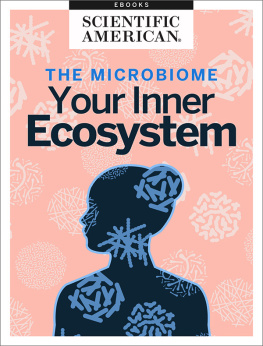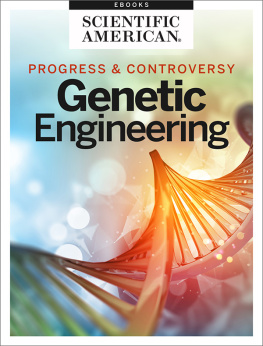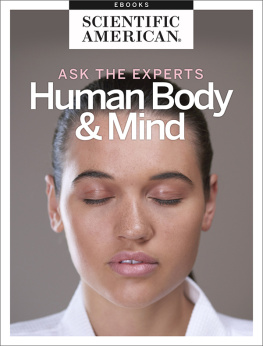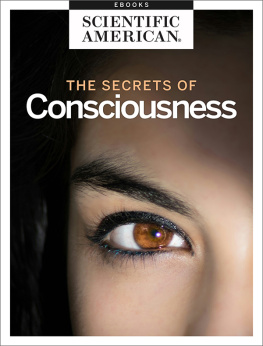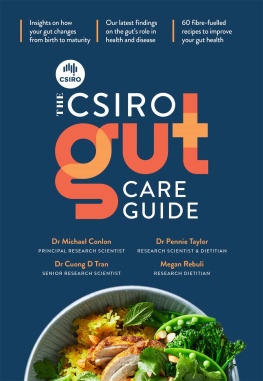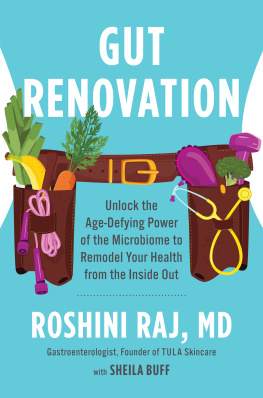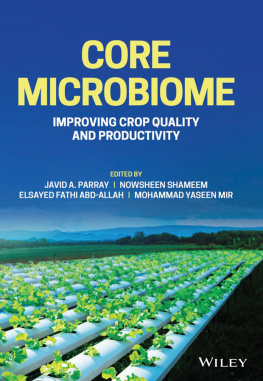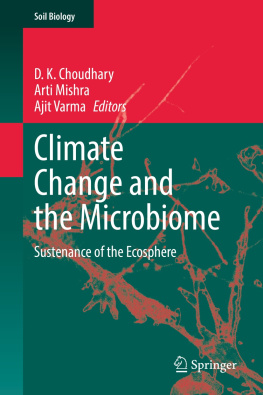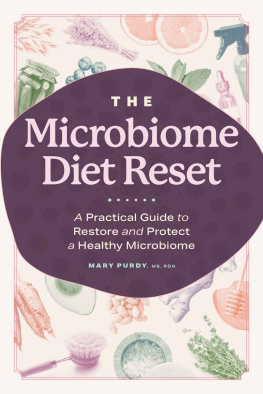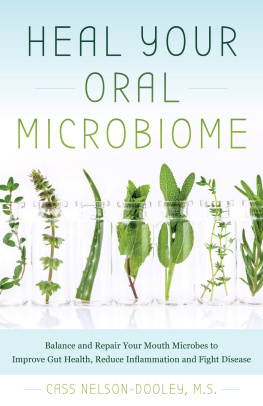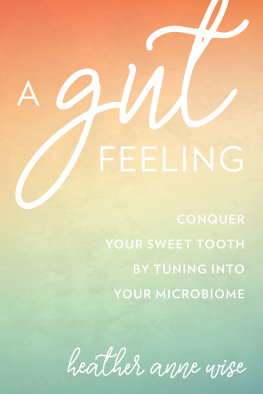The Microbiome
Your Inner Ecosystem
From the Editors of Scientific American
Cover Image
Bacteria: Yevhenii Dubinko/Getty Images
Silhouette: Dshnrgc/Getty Images
Letters to the Editor
Scientific American
One New York Plaza
Suite 4500
New York, NY 10004-1562
or editors@sciam.com
Copyright 2019 Scientific American, a division of Nature America, Inc.
Scientific American is a registered trademark of Nature America, Inc.
All rights reserved.
Published by Scientific American
www.scientificamerican.com
ISBN: 978-1-948933-05-6


THE MICROBIOME
Your Inner Ecosystem
From the Editors of Scientific American
Table of Contents
Introduction
by Ricki Rusting
Section 1
1.1
by Jennifer Ackerman
1.2
by Moises Velasquez-Manoff
1.3
by Knvul Sheikh
1.4
by Sarah DeWeerdt
1.5
by Ewen Callaway
1.6
by Ranna Samadfam
1.7
by Karen Weintraub
1.8
by Dina Fine Maron
1.9
by Rachel Feltman
1.10
by Melinda Wenner Moyer
1.11
by Alison Abbot
Section 2
2.1
by Peter Andrey Smith
2.2
by Melinda Wenner Moyer
2.3
by Bret Stetka
Section 3
3.1
by Claudia Wallis
3.2
by Roxanne Khamsi
3.3
by Katherine Harmon Courage
3.4
by Bret Stetka
3.5
by Ellen Ruppel Shell
Section 4
4.1
by Michael Eisenstein
4.2
by Sarah DeWeerdt
4.3
by Knvul Sheikh
4.4
by Bob Roehr
4.5
by Matthew Sedacca
4.6
by Bijal Trivedi
4.7
by Deborah Franklin
Section 5
5.1
by Michael Fischbach
5.2
by Liam Drew
5.3
by Maria-Luisa Alegre and Thomas F. Gajewski
5.4
by Jordana Cepelewicz
5.5
by Ken Garber
5.6
by Ferris Jabr
5.6
by Justin L. Sonnenburg
5.7
by Timothy K. Lu and Oliver Purcell
Meet Your Microbiome
Biologists have long known that friendly microorganisms live on and in our bodies. Recent research shows that we harbor enormous numbers of themparticularly in our G.I. tract but also in the respiratory tract, on the skin and elsewhere. What is more, they are critical to our health. And disturbances in the bodys microbial populations may contribute to conditions as diverse as cancer, depression, obesity, irritable bowel syndrome, psoriasis and bad breath. Investigators are studying all these connections in the hope of finding new ways to fight disease. This eBook highlights some of the most exciting work.
To find out how the collection of microbes in the human bodythe microbiomekeeps us healthy, turn to Section 1. It details effects on such processes as immunity, child development, food selection, bone-density regulation and even, possibly, longevity. It also looks into controls on the microbiomes composition, such as the foods we ingest. As science writer Sara DeWeerdt notes in How Babys First Microbes Could be Crucial to Future Health, the microbiome becomes important very early in life. Improper development, she says, has been linked to a form of gut inflammation that can kill premature infants, and lesser changes in otherwise healthy infants might have long-term consequences for health, perhaps playing a part in conditions such as asthma and diabetes.
In Section 1 and elsewhere, you will sometimes see the word microbiota instead of microbiome. The terms can mean different things to different people but are often used interchangeably. In addition, recent evidence debunks a common myth that has spread widely in scientific and popular articles. An estimate from 1972 held that microbes outnumber human cells by 10 to 1; then in 2015, a team calculated that the ratio is closer to 1:1lower, yes, but still pretty astonishing. See the article for more. (We have added a corrective note wherever the original statistic appears.)
To dive deeper into the microbiomes amazing effects, Sections 2 and 3 focus on its mind-controlling tricks and its profound influence on weight, respectively. Surprisingly, as journalist Bret Stetka reports in Mind over Meal, procedures that reduce the size of the stomach do not cause weight loss solely by leaving less room for food; they also alter the microbiome in the stomach in ways that can affect appetite.
Microbiome imbalances have been implicated in many different diseases, including those described in Section 4. These articles explain what we know about links to irritable bowel disease, colon cancer, breast cancer, liver disease and others. In the case of irritable bowel syndrome, investigators are having some success treating the condition by delivering selected microbes.
What if knowledge of the microbiome could be exploited to treat both microbiome-related disorders and others? Section 5 explores several ways the microbiome could be therapeutic. A particularly cutting-edge approach is to reprogram bacterial cells so that they can detect or even treat cancer and other disorders. The authors of Machine Life, this books last article, are optimistic: As we gain deeper insight into how the microbiome affects human health, they predict, we should find engineered bacteria to be beneficial therapeutics for a widening array of diseases.
- Ricki Rusting
Book Editor
SECTION 1
How Your Microbiome Keeps You Healthy
The Ultimate Social Network
by Jennifer Ackerman
Biologists once thought that human beings were physiological islands, entirely capable of regulatingtheir own internal workings. Our bodies made all theenzymes needed for breaking down food and using itsnutrients to power and repair our tissues and organs.Signals from our own tissues dictated body states such as hungeror satiety. The specialized cells of our immune system taughtthemselves how to recognize and attack dangerous microbespathogenswhile at the same time sparing our own tissues.
Over the past 10 years or so, however, researchers havedemonstrated that the human body is not such a neatly self-sufficient island after all. It is more like a complex ecosystema social networkcontaining trillions of bacteria and other microorganismsthat inhabit our skin, genital areas, mouth andespecially intestines. In fact, most of the cells in the humanbody are not human at all. Bacterial cells in the human bodyoutnumber human cells 10 to one (*see Editor's Note). Moreover, this mixed communityof microbial cells and the genes they contain, collectivelyknown as the microbiome, does not threaten us but offers vitalhelp with basic physiological processesfrom digestion togrowth to self-defense.
So much for human autonomy.
Biologists have made good progress characterizing the mostprevalent species of microbes in the body. More recently, theyhave begun to identify the specific effects of these residents. Inso doing, they are gaining a new view of how our bodies functionand why certain modern diseases, such as obesity and autoimmunedisorders, are on the rise.
Out of Many, One
When people think of microbes in the body, they usually think ofpathogens. Indeed, for a long time researchers focused solely onthese harmful bugs and ignored the possible importance of morebenign ones. The reason, argues biologist Sarkis K. Mazmanianof the California Institute of Technology, is our skewed view ofthe world. Our narcissism held us back;we tended to think we had all the functionsrequired for our health, he says.But just because microbes are foreign,just because we acquire them throughoutlife, doesnt mean theyre any less afundamental part of us.

